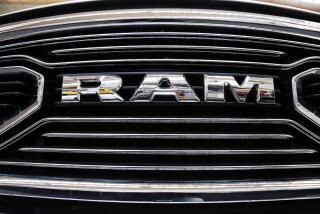GM will pay $20K to over $5M per victim in ignition switch cases

General Motors is set to give payouts to families of victims who died as a result of a defective ignition switch in GM cars.
- Share via
A special victims-compensation consultant hired by General Motors announced the details of a sweeping program to pay for the deaths and injuries caused by faulty ignition switches in millions of the automaker’s small cars.
Attorney Kenneth Feinberg said Monday he would begin evaluating victims’ claims starting Aug. 1 and begin paying damages from a GM fund within 90 to 180 days from when a claim is submitted.
The program provides a sliding scale of payments depending on the severity of injuries or whether a person was killed in a crash. It will range from $20,000 for someone who is slightly hurt to more than $5 million for a 25-year-old who was married with two children and earned $75,000 annually.
“We will work closely with all individual claimants and their lawyers in evaluating individual claims and reaching a determination as to eligibility and value as soon as possible,” Feinberg said.
The program is designed to compensate the heirs of people killed and the damages of those injured when the ignition switch suddenly shut down the vehicles, turning off critical functions such as the power steering and airbags. GM recalled about 2.6 million vehicles because of the problem.
GM has acknowledged at least 13 deaths and more than 50 crashes resulting from the defect, but federal safety investigators say the numbers could be higher. The automaker knew about the problem for at least a decade but waited until earlier this year to start to recall the cars.
GM has accepted blame for the problem. It commissioned an internal investigation by U.S. Atty. Anton Valukas that blamed poor communication and incompetence for the automaker’s failure to recall the cars promptly.
“We are taking responsibility for what has happened by treating them with compassion, decency and fairness,” GM Chief Executive Mary Barra said Monday. “To that end, we are looking forward to Mr. Feinberg handling claims in a fair and expeditious manner.”
GM faces ongoing investigations by the National Highway Traffic Safety Administration, the Justice Department and Congress into why it delayed recalling the defective vehicles.
“The fund offers GM a break from its tragically troubled past,” said Sen. Richard Blumenthal (D-Conn.). “The strong presumption should be in favor of drivers or others who claim injury, death, or damage, because records may be missing and evidence irretrievable. GM must also ensure that victims have a real choice between using the fund and pursuing their claims in court.”
Blumenthal said victims should be able to wait on deciding to accept compensation until after the conclusion of a Justice Department criminal investigation into GM’s delay in recalling the vehicles.
Feinberg said the program was voluntary. People could submit claims and would waive their rights to litigate against GM only if they accepted the compensation.
He will be the sole decision-maker on the size of the payments. Under his agreement with the automaker, GM does not have the right to veto an award. Moreover, the program does not have a cap. GM will pay whatever Feinberg deems is appropriate for each claim.
The fund won’t pay for property claims and other types of damages, such as the loss of resale value because a car is one of the models linked to the switch problem. It also won’t cover emotional and psychological injury claims.
Laura Christian, of Harwood, Md., the birth mother of 15-year-old Amber Marie Rose, who died in a 2005 accident in which the airbags did not deploy in her vehicle, attended Feinberg’s news conference and spoke with him briefly afterward. Christian said she was still processing the information and would discuss the compensation fund details with her attorney.
“It was quite difficult to hear Amber being reduced to a dollar amount,” Christian said.
Christian said she was pleased that victims’ families would not be required to keep silent about the accidents if they accepted money from the fund.
“It’s really not about the money,” she said. “It’s really about making sure, for me, that each and every single person that died is acknowledged.”
Rosie Cortinas, of Homedale, Idaho, also attended Feinberg’s announcement. Her son Amador, 23, died in an accident in a 2005 Chevrolet Cobalt in October 2013.
“I just want General Motors to be held responsible for the deaths of all these others who can’t speak for themselves,” Cortinas said. She was unsure if she would accept compensation from the fund.
“Life is a great thing to lose, and numbers right now, they’re not calculating right here in my head,” she said. “It’s the loss of my son … he didn’t have to die.”
The program quickly drew criticism from product liability attorneys representing victims.
Attorney Jere L. Beasley said it would allow GM to escape punitive damages.
“GM’s conduct, based on the incompetence and gross negligence found by the Valukas investigation, deserves punishment,” Beasley said. “It is totally unfair to allow GM to escape being punished for its wrongful conduct over a period of 11 years.”
Those making claims must prove that the switch was the “proximate” cause of the death or injury in the crash. People will have until Dec. 31 to file their claims.
The fund covers crashes from several sets of vehicles. The first set is comprised of the following autos as long as they had their original ignition switches: 2005-2007 Chevrolet Cobalt, 2006-2007 Chevrolet HHR, 2007 Daewoo G2X, 2007 Opel/Vauxhall GT, 2005-2006 Pontiac G4, 2007 Pontiac G5, 2005-2006 Pontiac Pursuit, 2006-2007 Pontiac Solstice, 2003-2007 Saturn Ion and 2007 Saturn Sky.
The second set includes vehicles in which the original switch might have been replaced with a faulty one and the crash occurred after the replacement. That’s because GM installed defective switches in some cars as part of a repair. Those vehicles are the 2008-2010 Cobalt, 2008-2011 HHR, 2008-2009 G2X, 2008-2010 GT, 2008-2010 G5, 2008-2010 Solstice and 2008-2010 Sky.
No other GM vehicles are part of the compensation program.
Feinberg says he will reject claims for crashes in which airbags and seatbelt pretensionors worked correctly. Pretensionors rapidly tighten seatbelts in crashes to hold passengers firmly in their seats.
Generally, those filing claims will have to submit police reports, any computer data captured from the vehicle as part of an accident investigation, a vehicle identification number and other relevant evidence.
People may have trouble finding the documentation they need to make a claim, said Clarence Ditlow, executive director of the Center for Auto Safety.
Ditlow said the majority of claims will likely involve older vehicles that are no longer available for investigators to examine. In crashes before 2010, police reports are unlikely to be available.
“It will be difficult, if not impossible, for a consumer to prove that ignition switch failure caused a crash if all they have is their statement that the ignition switch cut off,” Ditlow said.
“At the very least, in processing claims, Mr. Feinberg must apply a presumption that if there is a record of stalling on a vehicle, the claim is valid. To do otherwise will be to deny most claims filed by consumers who cannot afford lawyers or experts.”
For the latest auto news, follow @LATimesJerry








